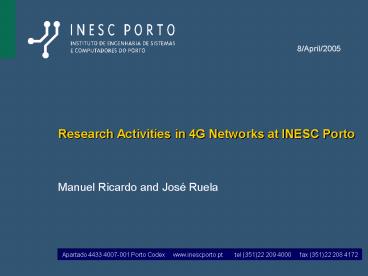Research Activities in 4G Networks at INESC Porto
Title: Research Activities in 4G Networks at INESC Porto
1
Research Activities in 4G Networks at INESC Porto
- Manuel Ricardo and José Ruela
2
Communication Networks and Services Group
- People
- 2 professors
- 2 senior researchers
- 6 PhD students
- 6 MSc students
- Variable number of Licenciatura students
- Located at
- INESC Porto
- Campus da FEUP Faculdade de Engenharia da
Univ. do Porto
3
Research in Mobile Communications Context
- Mobile communications networks vs fixed networks
- mobility of the terminals
- properties of wireless links
- variable bit rates, variable bit error ratios
- terminal characteristics
- low processing capabilities, low memory, low
consumption - 2 key research areas in Networking
- 4G networks
- Ambient networks
4
Research in Mobile Communications 4G Networks
- 4G mobile terminal
- Always Best Connected to the available networks
- Multiple network interfaces, of different radio
technologies - Information conveyed as IP packets
- Research problems include
- Mobility support, routing
- QoS, radio resource management, traffic
accounting - Security
- Ad-hoc, mobile networks
- Improvement of existing PLMNs (e.g. GPRS, UMTS) ?
VoIP, multicast - Planning, management, and operation
- In Europe ? focused on IPv6
5
Research in Mobile Communications Ambient
Networks
- Ambient intelligence
- People immersed in reacting environments
- Persons carry small devices ? may form a PAN
- Devices
- communicate over radio links connections with
neighbour networks - Research problems include
- Plug-and-play of unknown devices and networks
- Network composition
- Mobility, security
- Multihoming
6
Topics under Research at INESC Porto
- Ad-hoc networking
- Generic link layer
- QoS, congestion control
- Testing
- Multicast
7
Integrating Ad-hoc with Infrastructure Networks
- Ad-hoc used to extend the coverage of
infrastrucure networks - Current solution implements
- gateway discovery, address autoconfiguration,
MIPv6, AODV OLSR - Under work
- terminal handover between ad-hoc and
infrastructure modes - Multipath towards the infrastructure
8
Automatic Networking
- Plug-and-play of computers and networks
- Development of new signaling, which
- Detects/establishes links
- Detects other (ambient) networks / devices
- Forms networks using existing technologies
- IPv4, NAT, DHCP, IPv6, MIPv6, HIP, tunnels,
IPSec, PPox, PPTP - Exchanges information about routing, security,
and QoS - Addresses also multi-homing, multicast and
mobility
9
Service Announcement over Ambient Networks
10
Generic Link Layer for Heterogeneous Networks
QoS
- QoS reservation in heterogeneous wireless
networks - QoS-enabled virtual channels between MN and AR
- Technology-independent interface for
- 802.15.1, 802.11, 802.16, UMTS
- Support for handover and multicast
11
Generic Link Layer RoHC, Robust Header
Compression
- VoIP, mobile VideoIP - very small IP packets
- IP/UDP/RTP headers ? significant overheads
- RoHC solution
- Adapts the IETF RoHC to heteregenous networks
- Compatible with QoS Generic Link layer
12
Generic Link Layer RoHC, Robust Header
Compression
13
End-to-End Quality of Service Framework
ScalServ
- Evolved from IntServ over DiffServ
- Provides end-to-end QoS to real time flows
- 3 service classes, with universal semantics
- Less than Best Effort, Best Effort, Assured
Delivery (AD) - AD service class
- Possible microflow aggregation
- Uses end-to-end signalling
- Interpreted at selected nodes in the access
networks
14
Congestion Control
- Assumption
- (some) networks do not provide QoS mechanisms
- but need to transport real time flows
- Development of new congestion control mechanisms
- preserve the network stability
- are media friendly
- can be combined with L4 (end-to-end) mobility
solutions
15
Passive Testing Monitoring Mobile Flows
- Detection of mobile flows and representing them
for - Operator traffic maps
- User received QoS under wireless and mobile
conditions - Sampling
16
Passive Testing Monitoring Mobile Flows
17
Testing Monitoring Platform for a 4G Operator
- Passive Measurements
- Traffic accounting
- Detection SLA violations
- User Location
- Active Measurements
- Bandwidth probing
18
Testing Protocol Conformance
- Protocol / system functional testing
- Automatic generation of tests from specifications
- Tests and results obtained on-the-fly
19
Multicast
- Addressed as an horizontal issue
- As a rule, every new work/ thesis addresses
multicast - Particular attention to video broadcast
- Definition of a secure IP multicast solution
- Transmission of multiple video channels
- Each channel viewed only by authorized users
- If a channel is not visualized, it is not
transmitted
20
Testbed 1 Infrastrucure and Ad-hoc
21
Testbed 2 QoS
22
Conclusions
- Research in mobile communications networks at
INESC Porto - Ad-hoc networking, Generic link layer, QoS,
Testing, Multicast - Area appealing and rewarding for research and
business - Group active at national and international level
- Other national research groups have similar
growth - We feel that, in Portugal, we are starting to
reach the critical mass required to enable mobile
communications to emerge as a relevant industry































